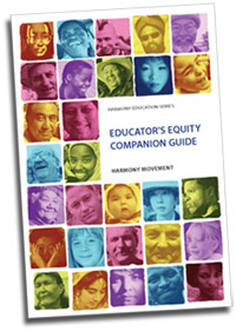
The Educator's Equity Companion Guide is a slim but rich thinking resource, available in hard copy or as an e-book. Our vice principal bought a copy for anyone wanting to participate in our book talk, and we currently have three small groups meeting to share insights about the topics.
My own group meets once a month for four months, at lunch time, in my classroom. In our first session, we read and discussed the introductory section, on identity and intersectionality. Our next meeting happens this coming week, as we begin to explore Section 2 of the book, on specific "isms".
If you have a copy of this book, I invite you to follow along on our learning journey!
More specifically, for our next session, we agreed to read the following:
- Ch. 2 - Faith (pg 38)
- Ch. 3 - MENTAL HEALTH (pg 44)
- Ch. 4 - Race (pg 51)
- Ch. 9 - Socio-Economic Status (pg. 88)
As you read, I invite you to consider the following for each chapter:
Ch. 2 - Faith (pg 38)
- How have I allowed my distaste for fundamentalism (which occurs in all religions) to influence my more general conscious or subconscious attitudes towards students, colleagues or others who come from Christian, Jewish, Muslim or Sikh families?
- How do I understand the difference between "tolerance" and "equity"? Which am I more comfortable promoting in my classroom? Why?
- How do my own religion-based prejudices prevent me from getting to know people; how have my assumptions created barriers to understanding my students, colleagues, others?
- Meet a Muslim Family is hosting meals between Muslims and Non-Muslims in Canada this month in an effort to promote cross-cultural understanding and eradicate Islamophobia. Would I be comfortable signing up for this initiative? Why or why not?
Ch. 3 - MENTAL HEALTH (pg 44)
- How is my perspective of western medicine biased in favour of physical health?
- What are some ways I could integrate a more holistic perspective into the curriculum and expose my students to said perspective? (WHO math, Aboriginal medicine wheel, etc.)
- How can we better care for our students and for each other? (consider those who show their mental heal issues vs those who don't)
- What surprised me about mental health history? (pp 46&47)
- How have I experienced stigma in terms of the following:
- getting help for a student?
- recognizing the need for support for myself or a family member?
- relating to a colleague?
Ch. 4 - Race (pg 51)
- The quote by Samuel Jackson on page 53 suggests that subliminal racism is worse that overt racism. Do I agree with this? What are some examples of subtle or implicit racism in our society? In our Schools?
- What are some ways I have addressed (or how can I address) Canada's history and ongoing reality of racism in my classroom? How do I address racism beyond the stereotypical "black/white" issue?
- Which of the "myths" on page 55 do I most relate to? Why?
- Why is "seeing colour" an important factor in the fight to eliminate racism?
- What is one specific action I can take to positively impact students of colour in my classes?
Ch. 9 - Socio-Economic Status (pg. 88)
- What makes addressing socio-economic diversity different from other forms of discrimination?
- What are some assumptions I make about my colleagues when I consider their socio-economic identity?
- What are some ways I can practically support the socio-economic needs of my students and/or colleagues while preserving their dignity?
- Reread the middle paragraph on page 90, and revisit the diagram on page 4. How do socio-economic factors intersect with other parts of identity?
- How might I artfully integrate "the Myth of Merit" (pg 91) into my academic curriculum in a way that empowers those students who suffer from socio-economic inequity while promoting critical thinking in those students who benefit from unearned socio-economic privilege?
- At our school, we have three "streams" or school "sub-communities". Is there a pattern of socio-economic differences between the students enrolled in FI, Sci/Tech and English stream? If so, what are some concrete steps we can take to work towards eliminating this inequity?
These are a lot of thinking questions, I know. Please consider reading and reflecting on ONE chapter a day or week.
Would love to see some specific questions, comments or concerns posted below, and will do my best to address these personally or have someone from my group respond!
Thank you for joining us on our learning journey.


 RSS Feed
RSS Feed